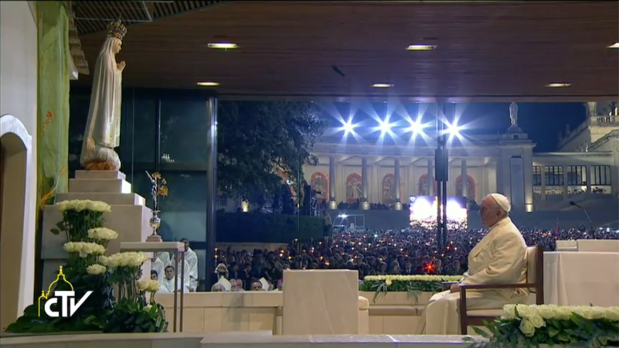FATIMA — “If we want to be Christian, we must be Marian,” Pope Francis told thousands of clergy, religious and lay pilgrims on the eve of the 100th anniversary of the Blessed Virgin Mary’s appearance to three children in Fatima.
Addressing pilgrims at the Chapel of the Apparitions, the pope said being Marian means “we have to acknowledge the essential, vital and providential relationship uniting Our Lady to Jesus, a relationship that opens before us the way leading to him.”
Silence and prayer pervaded the Marian shrine, as thousands of clergy, religious and lay faithful gathered for a blessing of candles and the pope’s address, followed by the recitation of the Holy Rosary in various languages, including Portuguese, Arabic, Spanish, Ukrainian, Italian, Korean, English, French, German and Polish.
The Chapel of the Apparitions is a small chapel located in Cova da Iria that was constructed in the 1920s to mark the exact location where the the Blessed Virgin Mary appeared to three shepherd children.
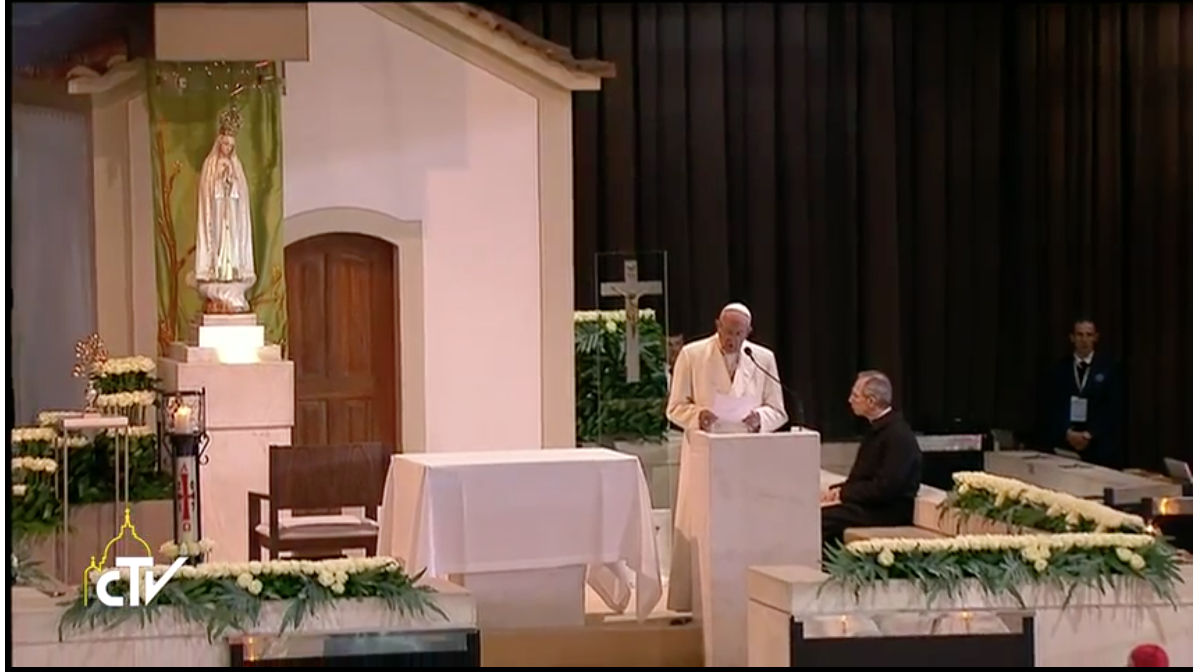
It was built in response to the request of Our Lady to Lucia, Jacinta and Francisco: “I want you to make a chapel here in my honor.”
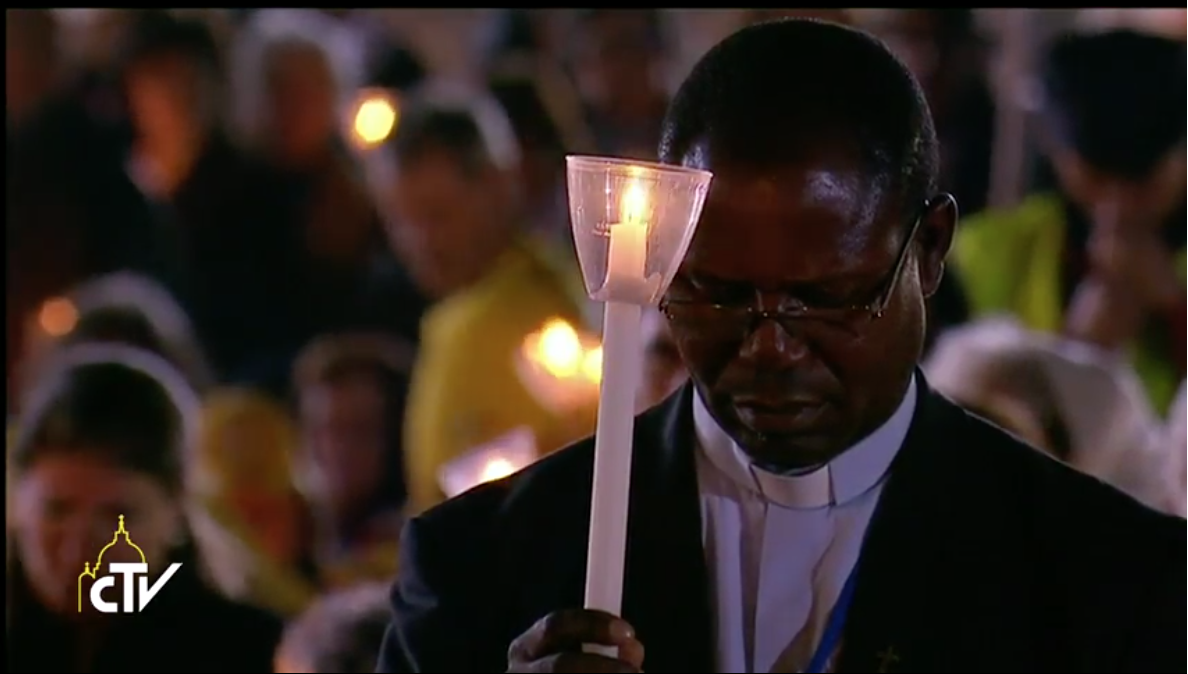
On Saturday, May 13, Pope Francis will canonize two of the Fatima visionaries, brother and sister Francisco and Jacinta Marto, on the 100th anniversary of the first apparition in 1917.
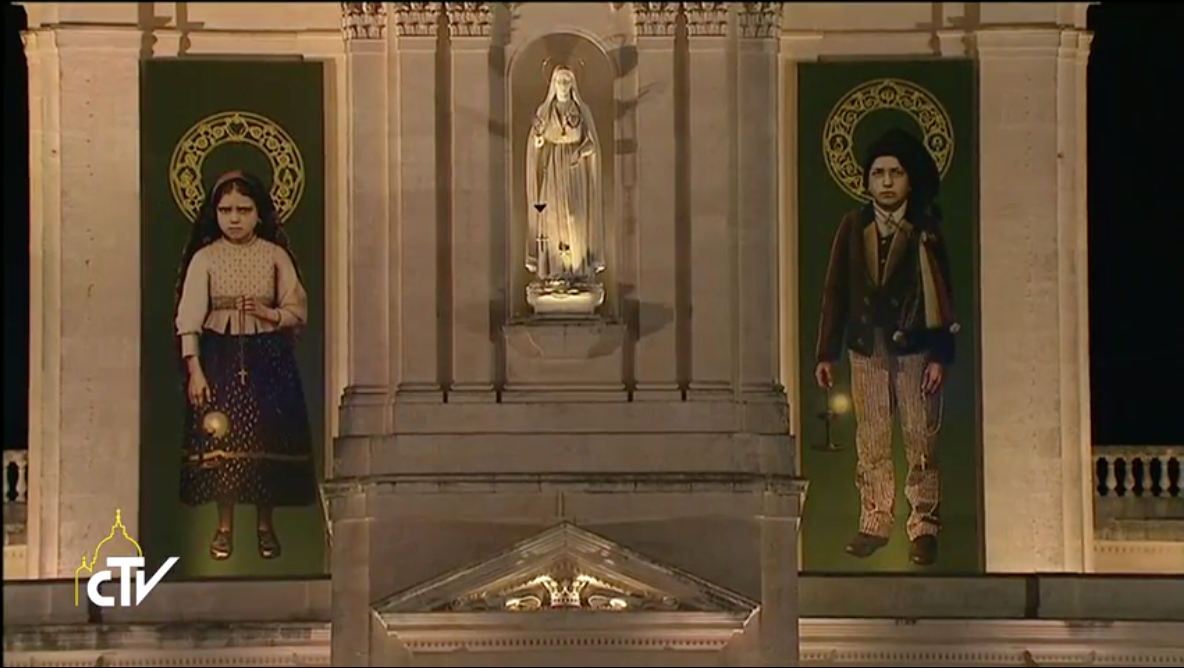
Here below is the official English text of Pope Francis’ first address in Fatima.
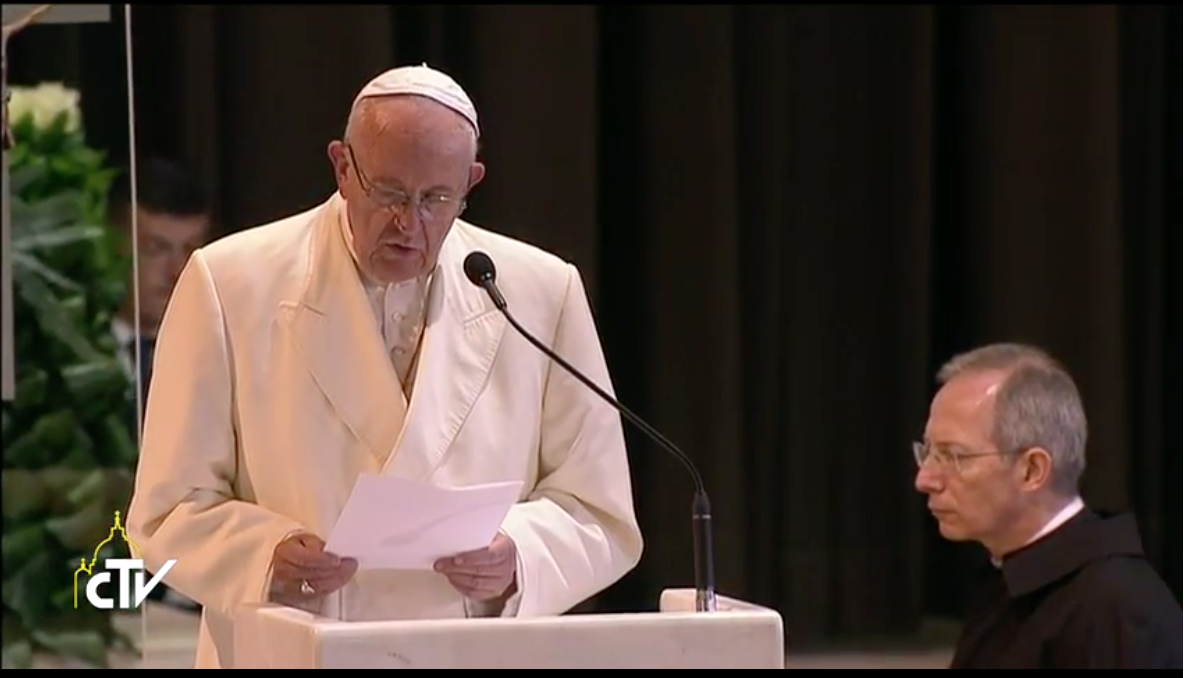
Greeting of His Holiness Pope Francis
Vigil at the Chapel of the Apparitions
May 12, 2017
Dear Pilgrims to Mary and with Mary!
Thank you for your welcome and for joining me on this pilgrimage of hope and peace. Even now, I want to assure all of you who are united with me, here or elsewhere, that you have a special place in my heart. I feel that Jesus has entrusted you to me (cf. Jn 21:15-17), and I embrace all of you and commend you to Jesus, “especially those most in need” – as Our Lady taught us to pray (Apparition of July, 1917). May she, the loving and solicitous Mother of the needy, obtain for them the Lord’s blessing! On each of the destitute and outcast robbed of the present, on each of the excluded and abandoned denied a future, on each of the orphans and victims of injustice refused a past, may there descend the blessing of God, incarnate in Jesus Christ. “The Lord bless you and keep you. The Lord make his face to shine upon you, and be gracious to you. The Lord lift up his countenance upon you, and give you peace” (Num 6:24-26).
This blessing was fulfilled in the Virgin Mary. No other creature ever basked in the light of God’s face as did Mary; she in turn gave a human face to the Son of the eternal Father. Now we can contemplate her in the succession of joyful, luminous, sorrowful and glorious moments of her life, which we revisit in our recitation of the rosary. With Christ and Mary, we abide in God. Indeed, “if we want to be Christian, we must be Marian; in a word, we have to acknowledge the essential, vital and providential relationship uniting Our Lady to Jesus, a relationship that opens before us the way leading to him” (PAUL VI, Address at the Shine of Our Lady of Bonaria, Cagliari, 24 April 1970). Each time we recite the rosary, in this holy place or anywhere else, the Gospel enters anew into the life of individuals, families, peoples and the entire world.
Pilgrims with Mary… But which Mary? A teacher of the spiritual life, the first to follow Jesus on the “narrow way” of the cross by giving us an example, or a Lady “unapproachable” and impossible to imitate? A woman “blessed because she believed” always and everywhere in God’s words (cf. Lk 1:42.45), or a “plaster statue” from whom we beg favors at little cost? The Virgin Mary of the Gospel, venerated by the Church at prayer, or a Mary of our own making: one who restrains the arm of a vengeful God; one sweeter than Jesus the ruthless judge; one more merciful than the Lamb slain for us?
Great injustice is done to God’s grace whenever we say that sins are punished by his judgment, without first saying – as the Gospel clearly does – that they are forgiven by his mercy! Mercy has to be put before judgment and, in any case, God’s judgment will always be rendered in the light of his mercy. Obviously, God’s mercy does not deny justice, for Jesus took upon himself the consequences of our sin, together with its due punishment. He did not deny sin, but redeemed it on the cross. Hence, in the faith that unites us to the cross of Christ, we are freed of our sins; we put aside all fear and dread, as unbefitting those who are loved (cf. 1 Jn 4:18). “Whenever we look to Mary, we come to believe once again in the revolutionary nature of love and tenderness. In her, we see that humility and tenderness are not virtues of the weak but of the strong, who need not treat others poorly in order to feel important themselves… This interplay of justice and tenderness, of contemplation and concern for others, is what makes the ecclesial community look to Mary as a model of evangelization” (Ap. Exhort. Evangelii Gaudium, 288). With Mary, may each of us become a sign and sacrament of the mercy of God, who pardons always and pardons everything.
Hand in hand with the Virgin Mother, and under her watchful gaze, may we come to sing with joy the mercies of the Lord, and cry out: “My soul sings to you, Lord!” The mercy you have shown to all your saints and all your faithful people, you have also shown to me. Out of the pride of my heart, I went astray, following my own ambitions and interests, without gaining any crown of glory! My one hope of glory, Lord, is this: that your Mother will take me in her arms, shelter me beneath her mantle, and set me close to your heart. Amen.
